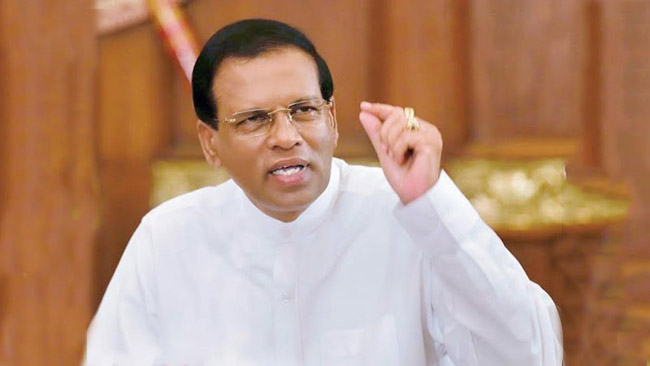Colombo, July 27 (NIA): Sri Lankan President and Sri Lanka Freedom Party (SLFP) Chairman, Maithripala Sirisena, has snubbed his party rival and former President Mahinda Rajapaksa by barring SLFP members and MPs from joining the Kandy to Colombo protest march planned by the Joint Opposition (JO) headed by Rajapaksa.
The march called the Pada Yathra, is to start at Kandy in Central Sri Lanka on July 28, and end at Colombo on August 1, with a massive rally for which the JO is expecting an unprecedented turnout of one million.
Skills Development Minister Manhinda Samarasinghe told newspersons here on Tuesday that the President had categorically disapproved participation of party men in the Pada Yathra when he met SLFP MPs at his official residence earlier. Samarsinghe further said that the President had asked Ministers to refute a story appearing in a section of the local media that he had sanctioned participation if he would not be criticized.
By disapproving participation, Sirisena has clearly indicated that he will have no truck with Rajapaksa, who, besides being an inner party rival, is also an opponent of the domestic and foreign policies of the coalition government which Sirisena heads as Sri Lanka’s President.
There is a faction in the SLFP which is still with Mahinda Rajapaksa even though Rajapaksa had handed over the Chairmanship of the party after Sirisena won the January 8, 2015 Presidential election as per the party’s constitution.
Peeved by the defeat at the hands of Sirisena, the Rajapaksa group, along with other small pro-Rajapaksa parties which are part of the United Peoples’ Freedom alliance (UPFA), are acting as the country’s opposition, both within and outside parliament. Within parliament it is known as the Joint Opposition (JO).
Being greater in numbers than the official opposition, which is the Tamil National Alliance (TNA), the JOG is generally seen as the real opposition despite the fact that some of its members are also members of the SLFP’s committees, including the decision-making Central Committee.
Though SLFP chairman and Sri Lankan President Maithripala Sirisena has been winning over Rajapaksa loyalists to his side with offers of ministerial posts, the JOG has a slight majority of SLFP-UPFA MPs.
Sirisena’s decision not to support the JO march fits in with his desire to strengthen the coalition with the UNP and other parties, especially those of the minority Tamil and Muslim parties. The minorities’ parties see the Pada Yathra as a means to discredit the government’s inclusive political agenda, its desire to build bridges with all countries and also pursue ethnic reconciliation as per the resolution it jointly sponsored with the US at the UN Human Rights Council on Geneva on October 1, 2015.
It is now clear that despite resolute opposition from the JO, the SLFP Sirisena faction and the UNP have agreed to go ahead with negotiations for an Economic and Technical Cooperation Agreement (ETCA) pact with India and to sign it by year end.
Though Sirisena and Prime Minister Ranil Wickremesinghe of the UNP have differed on many issues, including taxation and the issue of replacing the Governor of the Central Bank, they have eventually come to an understanding in the interest of national stability, which both Sirisena and Wickremesinghe consider to be necessary for securing foreign investment to build Sri Lanka.
In this context, it would have been inappropriate for Sirisena to give sanction to SLFP persons and MPs to join a JO log march.
It is not clear as to how many SLFP MPs and members will join the march. But the Communist Party has already opted out and the Lanka Sama Samaj Party is reportedly lukewarm towards it.
The rally is expected to be dominated by the Sinhalese-Buddhist nationalists and anti-minority politicians. As such, the parties of the minorities’ have strongly opposed it on the grounds that it will only exacerbate ethnic and religious divisions when the need of the hour is unity, stability, equitable economic development and ethnic reconciliation in Sri Lanka.

























































